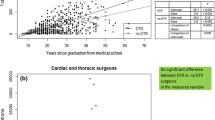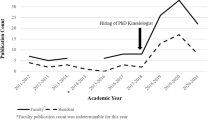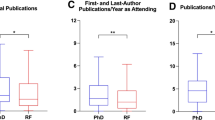Abstract
Backgrounds
Academic plastic surgery has utilized different methods to promote early involvement of trainees in research. Further analysis is needed to characterize the effects of this early emphasis and their impact on long-term academic contributions to the field.
Methods
In October 2020, a cross-sectional study of 949 faculty from US academic plastic surgery programs was conducted using publicly available websites. Training research output for each surgeon was compared to post-training research output and other metrics measuring sustained career scholarship.
Results
Increased training publications (P< 0.0001) and citations (P< 0.0001) were associated with fewer years in practice. 727 surgeons (80.0%) had ≥ 1 research article, and this group proceeded to attain significantly higher mean post-training publications per year (3.04 ± 0.14 vs. 1.45 ± 0.13, P< 0.0001) and citations per year (72.12 ± 5.04 vs. 28.39 ± 3.49, P< 0.0001) compared to the 182 (20.0%) surgeons with no training publications. For individuals, total training publications were positively correlated with post-training publications per year (P< 0.0001), a relationship also observed for citations (P< 0.0001). When controlling for years in practice, increased training publications and/or citations were significantly associated with attaining academic professor track (versus clinical professor track) position, endowed professor status, journal board position, and NIH funding (P< 0.05 for all).
Conclusions
There is a trend of increasing research productivity during plastic surgery training, and increased training output is predictive of attaining multiple measures of career academic achievement. Academic plastic surgery should continue to underscore research participation as a valuable part of the training process.
Level of Evidence V
This journal requires that authors assign a level of evidence to each article. For a full description of these Evidence-Based Medicine ratings, please refer to the Table of Contents or the online Instructions to Authors www.springer.com/00266.


Similar content being viewed by others
References
Janis JE, Hatef DA (2008) Resident selection protocols in plastic surgery: a national survey of plastic surgery program directors. Plast Reconstr Surg. https://doi.org/10.1097/PRS.0b013e31818d20ae
Egro FM, Vangala SK, Nguyen VT, Spiess AM (2017) Hand surgery fellowship selection criteria: a national fellowship director survey. Arch Plast Surg. https://doi.org/10.5999/aps.2017.44.5.428
Egro FM, Saliu OT, Nahai F, Nguyen VT (2017) Aesthetic surgery fellowship selection criteria: a national fellowship director survey. Aesthet Surg J. https://doi.org/10.1093/asj/sjx020
Egro FM, Blecher NA, Losee JE, Nguyen VT, Goldstein J (2017) Craniofacial surgery fellowship selection criteria: a national program director survey. J Craniofac Surg. https://doi.org/10.1097/SCS.0000000000003695
Egro FM, Blecher NA, Gimbel ML, Nguyen VT (2017) Microsurgery fellowship selection criteria: a national program director survey. J Reconstr Microsurg. https://doi.org/10.1055/s-0036-1597569
Nguyen AT, Janis JE (2012) Resident selection protocols in plastic surgery: a national survey of plastic surgery independent program directors. Plast Reconstr Surg. https://doi.org/10.1097/PRS.0b013e318258d4dd
Janis JE, Barker JC (2016) Medical student mentorship in plastic surgery: the mentor’s perspective. In: Plast Reconstr Surg. https://doi.org/10.1097/PRS.0000000000002670
Nagarkar PA, Janis JE (2018) Eliminating geographic bias improves match results: an analysis of program preferences and their impact on rank lists and results. Plast Reconstr Surg. https://doi.org/10.1097/PRS.0000000000004485
Carney MJ, Weissler JM, Koltz PF, Fischer JP, Wu LC, Serletti JM (2017) Academic productivity, knowledge, and education in plastic surgery: the benefit of the clinical research fellow. Plast Reconstr Surg. https://doi.org/10.1097/PRS.0000000000003681
Mehta K, Sinno S, Thanik V, Weichman K, Janis JE, Patel A (2019) Matching into integrated plastic surgery: the value of research fellowships. Plast Reconstr Surg. https://doi.org/10.1097/PRS.0000000000005212
Abdelhakim M, Soto Diez C, Huang C, Goutos I, Orgill DP, Ogawa R (2021) Plastic surgery fellowship at nippon medical school hospital: an integrative approach to modern plastic surgery education. Plast Reconstr Surg Glob Open. https://doi.org/10.1097/gox.0000000000003367
Levi B, Longaker MT (2011) Research training in plastic surgery. J Craniofac Surg. https://doi.org/10.1097/SCS.0b013e318208ba73
Plastic and Reconstructive Surgery. Accessed January 13, 2021. https://journals.lww.com/plasreconsurg/pages/prs-and-prs-global-open-resident-advisory-board.aspx
Ngaage LM, Elegbede A, Mcglone KL et al (2020) Integrated plastic surgery match: trends in research productivity of successful candidates. Plast Reconstr Surg. https://doi.org/10.1097/PRS.0000000000006928
Delong MR, Hughes DB, Tandon VJ, Choi BD, Zenn MR (2014) Factors influencing fellowship selection, career trajectory, and academic productivity among plastic surgeons. Plast Reconstr Surg. https://doi.org/10.1097/01.prs.0000438043.98762.51
Lee DT, Lacombe J, Chung CK, Kattan A, Lee GK (2013) Lag-time to publication in plastic surgery: potential impact on the timely practice of evidence-based medicine. Ann Plast Surg. https://doi.org/10.1097/SAP.0b013e31824bd75c
Mann M, Tendulkar A, Birger N, Howard C, Ratcliffe MB (2008) National institutes of health funding for surgical research. Ann Surg. https://doi.org/10.1097/SLA.0b013e3181568e26
Mellia JA, Jou C, Rathi S et al (2020) An In-depth analysis of research output in successful integrated plastic surgery match applicants and factors associated with matching at top-ranked programs. J Surg Educ. https://doi.org/10.1016/j.jsurg.2020.06.026
Plastic Surgery Research: A Means to an End?: Plastic and Reconstructive Surgery. Accessed January 13, 2021. https://journals.lww.com/plasreconsurg/FullText/2020/04000/Plastic_Surgery_Research__A_Means_to_an_End_.79.aspx
Asserson DB, Janis JE (2020) Majority of most cited articles in top plastic surgery journals do not receive funding. Aesthet Surg J. https://doi.org/10.1093/asj/sjaa379
Roy E, Egro FM, Zalewski A, Smith BT, Losee JE, Nguyen VT (2020) Influence of residency training on research productivity and plastic surgery career. Ann Plast Surg. 85(6):672–676. https://doi.org/10.1097/SAP.0000000000002514
Author information
Authors and Affiliations
Corresponding author
Ethics declarations
Conflict of interest
J.F. has received payments as a consultant from Baxter, Becton-Dickinson, Gore, and Integra Life Sciences. This research did not receive financial support for the study. For the remaining authors, no conflicts of interest or sources of funding were declared.
Ethical Approval
This study does not contain any experiments with human participants or animals performed by any of the authors.
Informed Consent
For this type of study, informed consent is not required.
Additional information
Publisher's Note
Springer Nature remains neutral with regard to jurisdictional claims in published maps and institutional affiliations.
Rights and permissions
About this article
Cite this article
Murphy, A.I., Mellia, J.A., Diatta, F. et al. “A Sign of Things to Come: Training Research Output Long-Term Scholarship in Academic Plastic Surgery.”. Aesth Plast Surg 45, 3022–3028 (2021). https://doi.org/10.1007/s00266-021-02290-8
Received:
Accepted:
Published:
Issue Date:
DOI: https://doi.org/10.1007/s00266-021-02290-8




